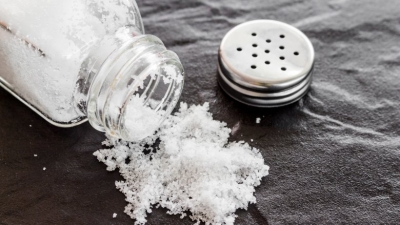
The water inside our bodies is salty – in fact, it is as salty as seawater. Salt, or sodium, help maintain the body’s water balance – the amount of salt dissolved in the blood tells the hypothalamus how much water the kidneys should release as urine, and how much to keep. Alongside potassium, salt also plays an essential role in helping nerve cells make signals.
The human body contains many salts, of which sodium chloride (AKA common table salt) is the major one, making up around 0.4 per cent of the body’s weight at a concentration pretty well equivalent to that in seawater. A child’s body contains the equivalent of 28 teaspoons of salt, while an adult’s body has 40 teaspoons.
So a 50kg person would contain around 200g of sodium chloride – around 40 teaspoons. Since we lose salt whenever we sweat, it has to be continually replaced.
While excessive consumption of it has been linked to high blood pressure and stomach cancer, salt is a vital part of body chemistry, playing a key role in many functions, from the quality of blood to transmission of nerve signals.
Picture Credit : Google

